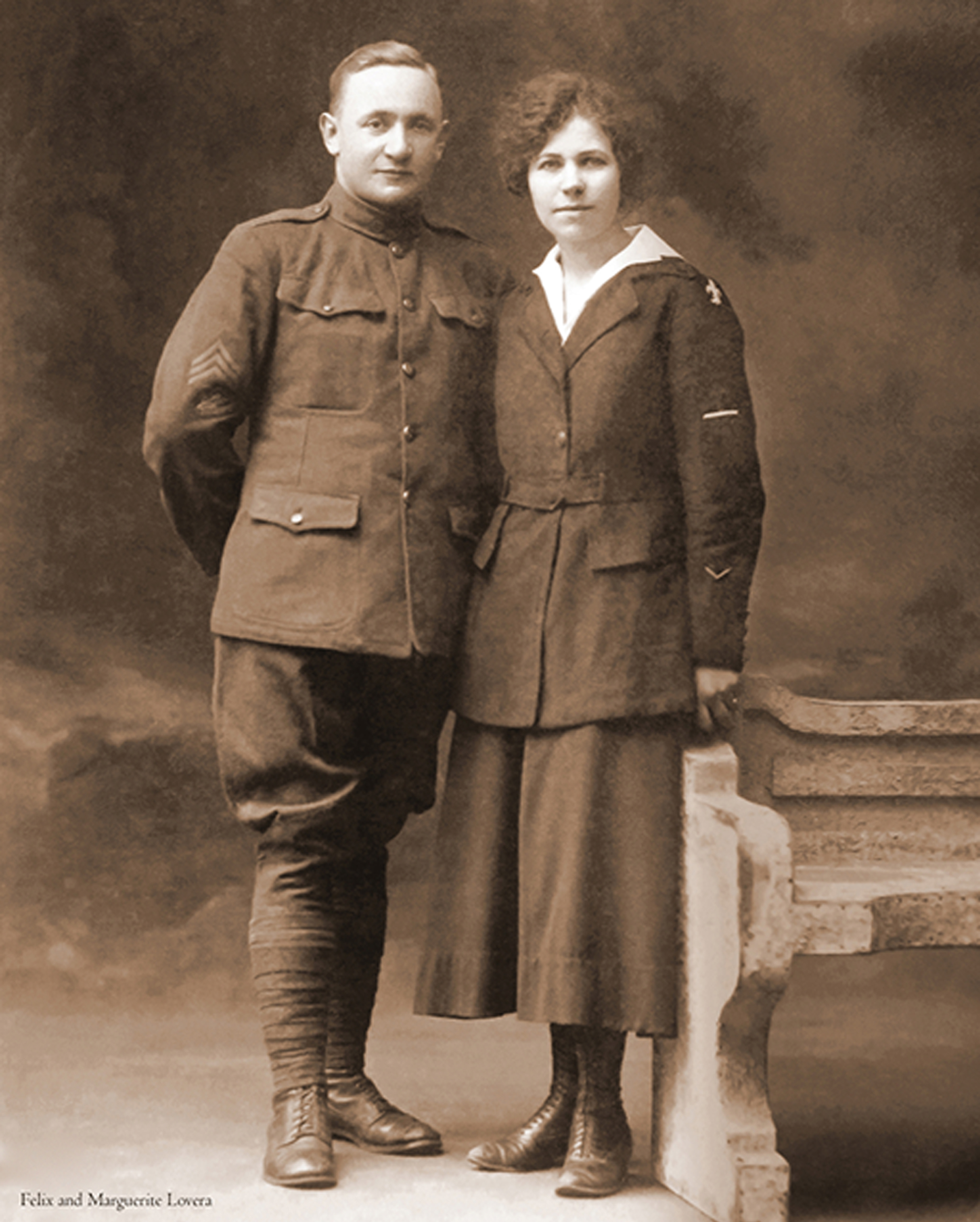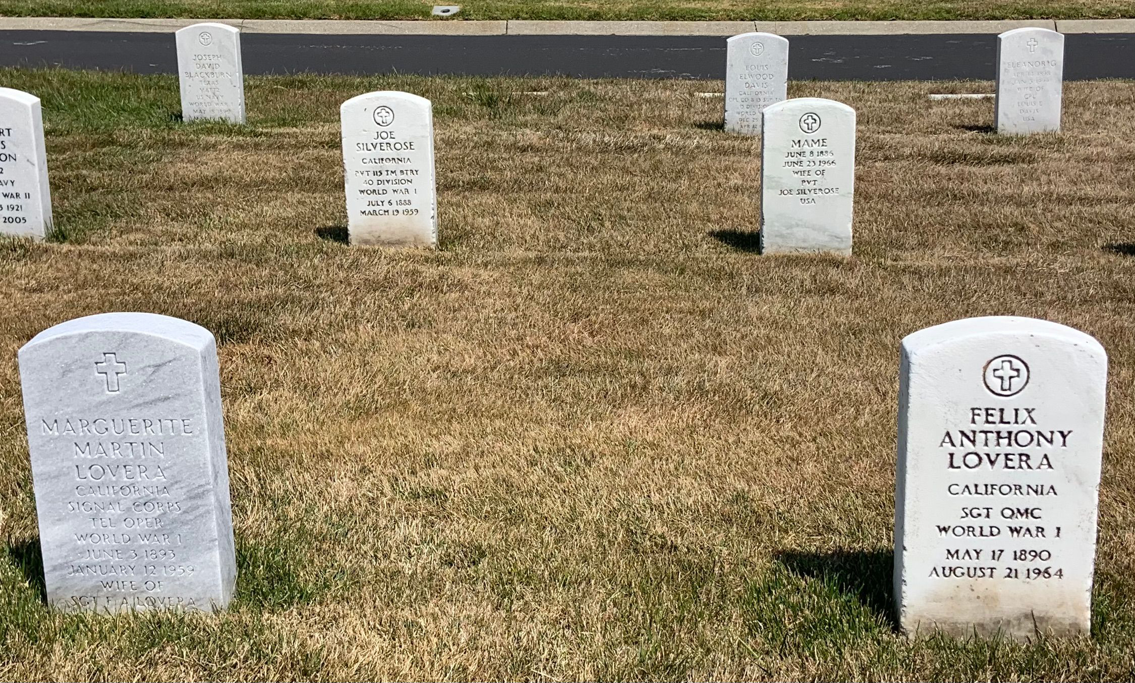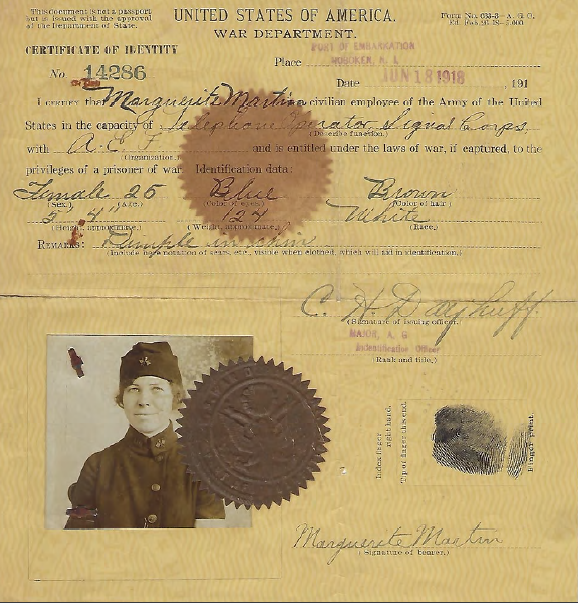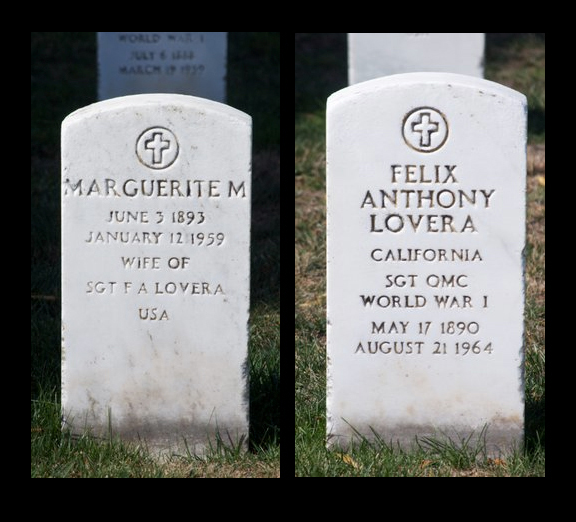
What drives people to join the military?
Patriotism? Poverty? Fear? Honor? Glory? Citizenship? The draft? Love?
The reasons are many and, in many cases, more than one reason applies.
This is the true story of Marguerite Martin and Felix Lovera, two young lovers who served in the United States Army in France during World War I.


Marguerite
To begin at the beginning, Marguerite’s father, Augustine Martin, was a Frenchman who worked as an engineer on France’s ill-fated attempt to build the Panama Canal. He fell ill with yellow fever and was sent up to San Francisco to recuperate. During his recovery he met and fell in love with another French immigrant, Rosalie Souquiere. Rather than return to Panama, he chose to stay and marry. They had a son and six daughters. His growing family felt secure because Augustine came from a family of means that provided the support of a trust fund. Then tragedy struck, they lost their son to disease.
Perhaps due to the loss of her son, Rosalie suffered a mental breakdown and was committed to an asylum where she would spend the rest of her life. In those times it was considered improper for a man to raise daughters alone, so Augustine’s daughters were placed in a Catholic orphanage south of San Francisco, where they grew up together.
Something Augustine had managed to forget or ignore for years was a betrothal (promise in marriage) when he was just 10 years old. A threat came from his family in France that unless he returned to fulfil the betrothal, he would be cut from the Trust. Rather than make his own way in the World, Augustine pulled up stakes, deserted the remnants of his torn American family and returned to France. He was to die at the early age of 48.
Out of all of this, the only physical proof Marguerite had of her past were some old photos and a silver baby spoon engraved with an “M” that her sisters kept hidden from the nuns all those years.
Felix
Felix Anthony Lovera was born on May 17, 1890 in Caraglio, Northern Italy. He grew up in a castle. You would think growing up in a castle would be fortuitous, romantic, a place of honor, a place of nobility, but that was hardly the case. His family had fallen on hard times. Their castle was damp, drafty and cold with rats running about. His father had enough money together to send Felix’s older brothers to college but by the time Felix was old enough the well had run dry. Through a family friend, his father was able to pull some strings and get him a job as Cabin Boy on a steamship. So, in 1907, at the age of 17, Felix set sail as a Merchant Marine where he moved up to working as a baker. When their ship docked in San Francisco, Felix seized the opportunity to jump ship and set off to seek employment in the New World. He quickly landed a job at a bakery as a bread delivery boy then worked his way up again to baker.
Love
In 1914 Felix was out delivering bread with his horse drawn cart. As he pulled up to the orphanage, Marguerite Martin stepped through the gate and asked, “Do you have any bread for me?” Felix responded in his broken English, “You may have my bread and you can have my cart, you may have my horse and you can have my heart.” And that is where this love story really began.
They fell in love yet try as he might, Felix could not convince Marguerite to marry. She refused to marry him until he became a US Citizen. With his illegal entry, how could he ever accomplish that?
War
And that is how things stood for three long years until America’s entry into the “War to End All Wars.” Enlisting for the duration during a time of war provided a quick path to citizenship. By enlisting, Felix could prove he wanted to marry Marguerite for love and was not trying to use her for a path to citizenship. And so, out of love, on June 6, 1917, two months after the US entered the conflict, Felix enlisted as a Sergeant in the Quartermaster Corps.
How could an illegal alien achieve enlistment as a sergeant rather than start as a private then work his way up though the ranks? Because he already knew how to bake bread in large quantities and because he could drive a horse and cart. The Army considered these to be invaluable and essential talents. You’ve probably heard the old adage, “An army marches on its stomach.”
Sgt. Lovera was assigned to Bakery Company 324 in France. Imagine being in a war-torn country with one emergency following another every day with the major languages spoken on your side being French and English whereas your native tongue is Italian followed by broken, hesitant English.
You may be thinking, baker? Just how bad could that be? Isn’t that rear echelon work? Not necessarily. There were no preservatives in those days. Bread had to be fairly fresh when it reached the front, so a field bakery had to be within delivery range. That puts the bakery within artillery range and moves the delivery wagons in and out of machine gun and rifle range.
But still, fresh bread? How important could that be?
Put yourself in the position of a soldier in the trenches up to your knees in mud and worse, much worse. With every breath inhaling the awful stench of warfare; death and gunpowder. Freezing cold rain, trench foot, rats, chlorine and mustard gas, artillery fire, exhaustion, lice, fleas, disease and some fool yelling, “Over the top!” Up and over you go across a field of death, explosions, into a storm of bullets, tripping over jagged shards of steel, getting snagged by barbed wire, stumbling across corpses, fixing bayonets and soldiering on until the order is yelled, and the bugles ring out, “Fall back!” You pray you make it, dragging a wounded friend if you can. Falling into the trench you desperately try to catch your breath knowing it’s just a matter of time before those who survived must rally to repel a German counter attack. As you’re looking around to see who failed to return this time, someone hands you a cup of warm stew with a hunk of fresh bread. For a brief moment, you are transported back to your mother’s kitchen. Just think of the affect that had on morale.
Meanwhile, Germans, on short rations, are eating whatever they can get their hands on; leather belts, horse meat, dogs, rats, captured rations. Across the stench of no-mans-land occasionally wafts the aroma of fresh baked bread from a field bakery. Just think of the affect that had on their morale.
For Marguerite, at first it had been so romantic. The sacrifice Felix was willing to make for her, his grin, his uniform, the day his train pulled out for Camp Greene, North Carolina as the band played, “Yankee Doodle.” Later, with little to do back home but work and worry, worry and pray and worry some more, Marguerite felt helpless with Felix so far from home. She questions why she was so adamant about him becoming a U.S. citizen and regrets her stubbornness. She hopes he will survive and won’t forget the girl back home. She begins going to the station to help with the returning wounded boys and as they climb, or are helped, from the same train Felix left on, she finds them shell shocked, missing arms, legs, blinded, on crutches, in wheel chairs. As the months pass she begins to worry that she may never see him again. Now she truly knows the chance he has taken to win her hand as well as how much she truly loves him.
November 1917, out of the blue, as if in answer to her prayers, she finds a newspaper advertisement calling for French/English speaking phone operators to serve with the US Army in France. The daughter of French immigrants, she was raised to speak fluent French. Marguerite sees a chance to serve her country and be closer to Felix as well. She volunteers and like Felix, she will also serve for the duration.
It is difficult to imagine the intense yearning and anguish that would drive two young people to place their lives on the line, travelling to a distant war five thousand miles away, to be closer to each other.
She is issued uniforms, receives training and is given orders to travel to Paris to serve in the US Army Signal Corps as one of just 223 female phone operators who would serve during The War to End All Wars. There are parties, newspaper articles are written about the operators then the band plays “Over There” while they board ship on June 28, 1918. As they sail past the French gift to America, the great Statue of Liberty, she feels proud to believe they will return the favor by liberating France.
Before reaching their destination, their ship must successfully navigate through a gauntlet of German battleships, mines and submarines on their voyage into the Hell that France had become. By this time the Germans are sinking an average of five ships a day. In her diary, Marguerite noted a near collision with a submarine in the fog and later, within sight of England, the firing of five rounds at a German submarine.
The phone operator’s in the United States had a very complicated job plugging and unplugging dozens of wires to connect parties quickly and efficiently and doing this mentally exhausting work for hours on end. Remembering which wires connect from one location to another on the fly takes an agile mind and intense focus.
In war the difficulty is multiplied tenfold. There was a protocol for prioritizing calls, from General Pershing right on down to the lieutenants in the trenches, yet, if there was an emergency, such as a breakthrough of German forces, priorities might change in an instant. Making the correct decision could mean life or death, victory or defeat. Through explosions, the crack of rifles and rat-a-tat of machine guns, screams, yells and groans coming across the line, the operators must keep their wits, speak in a professional voice, make sense of what is being said and make the connection to that person who can solve the problem.
There is one more important ability these operators had, which just may be the most important of all. Not only did they make connections under pressure, these operators spoke both French and English fluently. They were translators. The yelling and screaming during the heat of battle might be in either language. In addition to remaining calm and making sure the parties were properly and quickly connected, they had to ensure the parties could understand each other. What the “Hello Girls” brought to France was a communications “Unity of Command” for the Allied Forces. This is something the Allies had problems with prior to their arrival.
Being based in Paris was no guarantee of safety. Paris was hit by artillery and aerial bombardment regularly. The Paris Gun, called Big Bertha by many, was a German super cannon with an eighty-mile range that shelled Paris regularly. To illustrate that range, it could easily fire the 77-mile distance from the Liberty Bell in Philadelphia to hit the Statue of Liberty in New York. In her diary, Marguerite mentioned Bertha’s shelling several times; “Bertha busy all day,” “Heard first big bomb at 10 am, about three blocks away. Killed two of our boys, a horse, hole in ground 6 ft deep. Glass all around,” “About 2 p.m. one fell in building across street killing a young girl,” “Bertha Busy again today.”
Then in October she wrote; “Mon 28, Austrians stop fighting,” “Wed 30, Turkey surrendered, Germans to sign armistice.” In November she wrote, “Sun 10, Kaiser abdicates. Revolution in Germany.” “Mon 11, Armistice signed. 11:00 am, 11 canons go off. Excitement starts.” Tues 12 “People still shouting.”
Victory!
Somehow both Felix and Marguerite managed to survive unscathed. Among Marguerite’s effects is a request for leave to take effect on or about March 28, 1919 to visit friends in Brest. In Felix’s effects there is a program for a Farewell Grand Fete and Dance in honor of Bakery Company No. 324 to be held in Brest, on April 11, 1919. When juxtaposed these two dates cannot be a coincidence. Marguerite would continue working as a “Hello Girl” in Paris to finally be relieved of duty on August 6, 1919, five months after Felix had returned to the United States. Their meeting in Brest was the last time they would both be in uniform together. Look closely at a photo of Felix and Marguerite together in uniform. Marguerite is wearing a wedding ring.
Victory.
How does victory smell and sound?
One might say victory smells like fresh baked bread and sounds like a “Hello Girl” answering the call in perfect English with a faint French accent.
Written by Patrick A. Lundquist, a Vietnam Veteran and the grandson of Marguerite and Felix Lovera, US Army Veterans of WWI France
Afterword
* The granting of citizenship to an immigrant grants more than you might think. Their sense of duty and service may carry through to future generations. Felix and Marguerite went on to raise a son, Charles, and daughter, Katherine, both of whom were World War II veterans. Their grandson, Patrick Lundquist, is a Vietnam veteran. Two of their great grandsons, Bill and Tom Lundquist have served in the military as well.
** Felix continued to work as a baker until he retired. After retirement he walked eight miles a day plus worked in his garden. He suffered a massive heart attack at the age of 68. In hospital they restarted his heart seven times before they had to let him go. Because he had been so healthy they asked to do an autopsy. Baking gave him a chance to come to the United States, the opportunity to become a citizen, the chance to marry the girl he loved, provided for his family through the Great Depression and carried them to retirement. In the end, baking took his life. The autopsy found his lungs were clogged with flour so Felix died of Baker’s Lung.
*** Before the Women’s Suffrage Movement had won right for women to vote, the US Army, along with many others, viewed women as second-class citizens. The Hello Girls were not given the respect they earned for having volunteered to put their lives on the line serving as soldiers in a theater of war. Sadly, there are still many vestiges of that attitude continuing to this day.
Marguerite deserved to be buried with full military honors but having passed away in 1959, eighteen years before President Carter signed a law giving the “Hello Girls” veteran status, the only recognition she was permitted on her Golden Gate Veterans Cemetery headstone was, “Wife of Sgt FA Lovera.”

Believing it is a travesty that his grandmother, a veteran who played such a pivotal role in the victory during World War I, a veteran who is buried in a Veteran’s Cemetery, was denied recognition for her service as a soldier, Marguerite’s grandson began a campaign to have her headstone corrected. Initially he was told that any headstone over fifty years old is considered historical and so is difficult to change. How can something be considered historical if the facts have been omitted? He had just begun a letter writing campaign to senators, congressman, newspapers and the American Legion when word came back. The headstone change had been approved. “Good news – your request to have your grandmother’s inscription updated has been approved. It is authorized to read as follows,”:
(01 – Latin Cross in Inscribed Circle)
MARGUERITE
MARTIN
LOVERA
CALIFORNIA
SIGNAL CORPS
TEL OPER
WORLD WAR I
JUNE 3 1893
JANUARY 12 1959
WIFE OF
SGT F A LOVERA
The headstone stands as a reminder of the precedent women set during World War I that lead to future generations of women in the United State serving with full military status.












Thank you so much for sharing this story. God bless your grandparents and your military family.
I literally just received notice that the book “Hello Girls: America’s first Women Soldiers” by Elizabeth Cobbs, is waiting for pick up at my library. Can’t wait to read it!
What a beautiful story! Love conquered all! So glad the story was shared.
What a wonderful story!
Lovely story that reminds me not only about romance but the American ideal; self-sacrafice to save others.
What a fantastic story. Many thanks to Felix and Marguerite’s grandson for preserving and then sharing their amazing lives and for fighting for Marguerite’s right to be buried with all the honors she deserved.